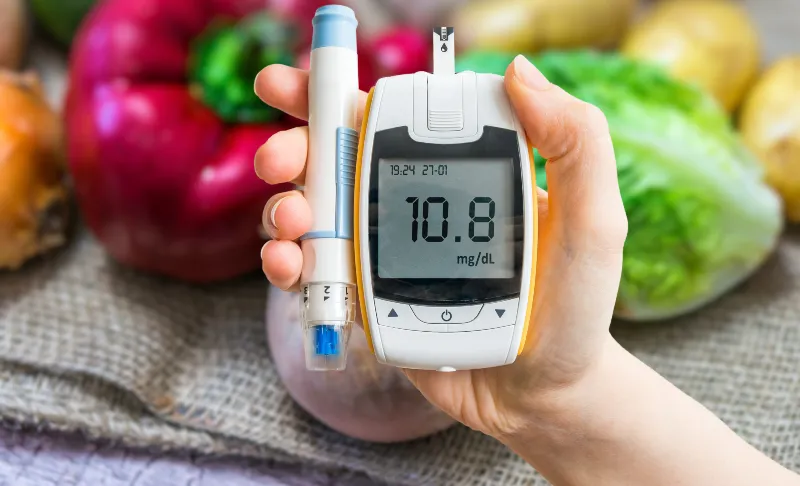10 tips to avoid diabetes and how to reverse a prediabetic state
The root causes of diabetes includes long-term consumption of an inflammatory diet, a high sugar diet, diet low in healthy fats, diet low in optimal protein, high stress, perpetuating insomnia, poor liver health, nutrient deficiencies, and much more.
Over the last year, the majority of my clients have been those in a prediabetic state or those who are technically already diabetic. Diabetes and metabolic conditions are rampant in India and there are reasons for this. These reasons themselves provide us with the clues as to what we need to do to prevent moving into a diabetic state.
In order to look at tips to support this journey, let’s first run through some of the causes of being insulin resistant, prediabetic, or diabetic.
Root causes of prediabetes and diabetes
Just to be clear, we are not referring to type I diabetes, which requires medical care and should not be ignored. However, a skilled practitioner will help you to manage type I as well.
The root causes of diabetes includes a long-term consumption of an inflammatory diet, a high sugar diet, diet low in healthy fats, diet low in optimal protein, high stress, perpetuating insomnia, poor liver health, nutrient deficiencies, and much more.
Liver health plays a pivotal role in blood sugar regulation and your predisposition to develop diabetes. Fatty liver also comes from having an inflammatory diet and lifestyle. They can also develop when you ignore daily digestive distress, which are signals from your body that your diet is not right. Resorting to popping pills like antacids and continuing with an unhealthy diet can lead towards fatty liver, which can then become a major factor in the development of diabetes.

Image: Shutterstock
How can you avoid diabetes?
Whether you are insulin resistant, prediabetic or diabetic, these tips will help you to improve the situation. Be gentle with yourself and include them slowly. Give yourself time for one thing to become a part of your life. Then when you think you are comfortable with that, add one more.
1. Meal timings are a big component of blood sugar management. You might hear people telling you to eat often if you have blood sugar issues, but the problem might be because you are already eating that way, and this paradigm does not support good health anymore.
Look at the structure of your meal. If you find yourself getting hungry within two hours of eating a meal, it does not always mean that you need food again. It might just tell you that your meal is poorly balanced with protein, fibre, and fats. Many traditional Indian meals can become mono diets, where it is predominantly starchy or grain heavy. A common thing I often hear from many people, including those who feel they are healthy, is that they do not consciously look for protein at all in their meals. They just try to see that it is there every day. This is a big slip up that cause problems.
Every single meal that you eat must have optimal protein, some healthy fats, and fibre from not starchy or low glycemic vegetables and grains.
2. There is a reason that research points towards improvement in diabetic patients in both the vegan population and the paleo eaters. This can go back to dairy. Unless your dairy is sourced from an organic grass fed space, antibiotic fee and hormone free, it is a reason for the inflammatory response which then triggers metabolic disease.
Look at most Indian keto plans out there, and you will see a predominantly dairy heavy diet, high in cottage cheese. The other reason that vegan and paleo research shows benefit to diabetes, is the plant powered plate rich in non-starchy colourful vegetables. This constitutes your fibre, which builds a robust microbiome, supporting optimal detoxification, liver health, and better blood sugar control. This does not mean one is better than the other. You need to consider what resonates with you personally.
3. A ketogenic diet done right can offer several benefits. However, relying on deliveries of keto meals is concerning. Vegetarian keto diets, as I mentioned earlier, can rely heavily on cottage cheese. The right way is to be plant powered with low glycemic vegetables and plenty of healthy fats.
Foods that are wonderful on this type of diet are avocados, coconut, coconut milk, ghee, olive oil, salmon, collagen, and turmeric. Moving through a cyclical keto, where you add healthy carbs like sprouted rice, quinoa, oats, sweet potatoes, and squash sometimes in the year can be very beneficial.
4. When you are not doing a keto diet, protein is important. With insulin resistance and prediabetes, protein needs are much higher than usual. Aim for optimal protein in a day, by always targeting some food proteins at every meal, and topping up with some clean protein powder if required to reach optimal levels.
5. Fasting is the oldest strategy in the texts, which support reversing diabetes. It allows your body to use up blood sugar with energy restriction.
There are much better inflammatory markers in response to incorporating fasting as a strategic healing tool. It is the simplest and fastest method. Including intermittent fasting and longer fasting, strategically, as you can, is beneficial. However, always remember that you need some guidance, especially if you have mental health challenges alongside diabetes.
6. Fasting can be a great tool to reverse insulin resistance if you are not in a situation with several health challenges. Fasting should be strategic and incorporated after you have brought the body to a better space. This is especially important for women. I have seen many women embracing intermittent fasting only to throw off their hormones and end up with anxiety.
7. Exercise is critical! You do need to include several forms of it to support reversing diabetes. These include aerobic exercise such as walking, jogging, and biking, which support slow fat burning. You also need burst training or HIIT training, where the muscles rapidly soak up blood sugar. Adding restorative forms like yoga helps to lower the stress response, which is critical to lowering inflammation.
8. Sleep might be the missing piece of your puzzle if you already have everything else in place. One night of poor sleep increases insulin resistance. If you are having persistent sleep issues, where you are sleeping too late in the night, not sleeping enough, or not having quality sleep, it can make things worse. One research found that sleeping one hour earlier reduced insulin resistance by 10 percent! This means going to bed earlier each night is a great way to support this journey of reversing diabetes!

Image: Shutterstock
9. Nutrients play a big role. You need to consider this in two ways. The first is that nutrient deficiencies themselves can contribute to poor blood sugar control. So, if your diet is restrictive and inflammatory, it might induce nutrient deficiencies which then trigger diabetes. If you are diabetic and on metformin, including for conditions like PCOS, that can also trigger deficiencies of key nutrients. It is important to monitor B12 levels.
The other aspect is that supporting your body with come nutrients can provide it with the scaffolding it needs to do the deeper work. These nutrients include chromium, vitamin D, magnesium, zinc, berberine, and curcumin. Always work with your nutritionist to include these at the right dose for you.
10. Essential oils are showing a lot of benefit to supporting reversal of diabetes. As an adjunct, they can be a wonderful tool. They are safe to use aromatically. Peppermint oil can be wonderful when battling with cravings. Cinnamon helps to improve insulin sensitivity. Using these in a diffusor is safe and beneficial.
There are so many aspects to consider beyond these. However, these are safe interventions, and you can begin incorporating them, as you feel comfortable. I would not advice attempting a keto diet without supervision. While I did mention it, I have seen people struggle on a keto diet when their liver is in bad shape. Always be cautious and begin where it feels right for you. Never negate the power of diet. Just reducing inframammary foods is a powerful start!
Edited by Megha Reddy
(Disclaimer: The views and opinions expressed in this article are those of the author and do not necessarily reflect the views of YourStory.)









